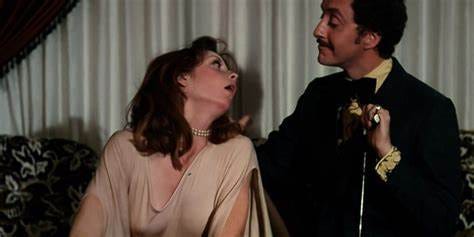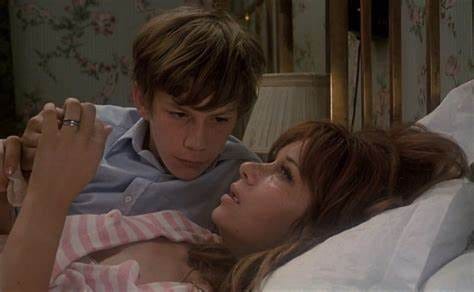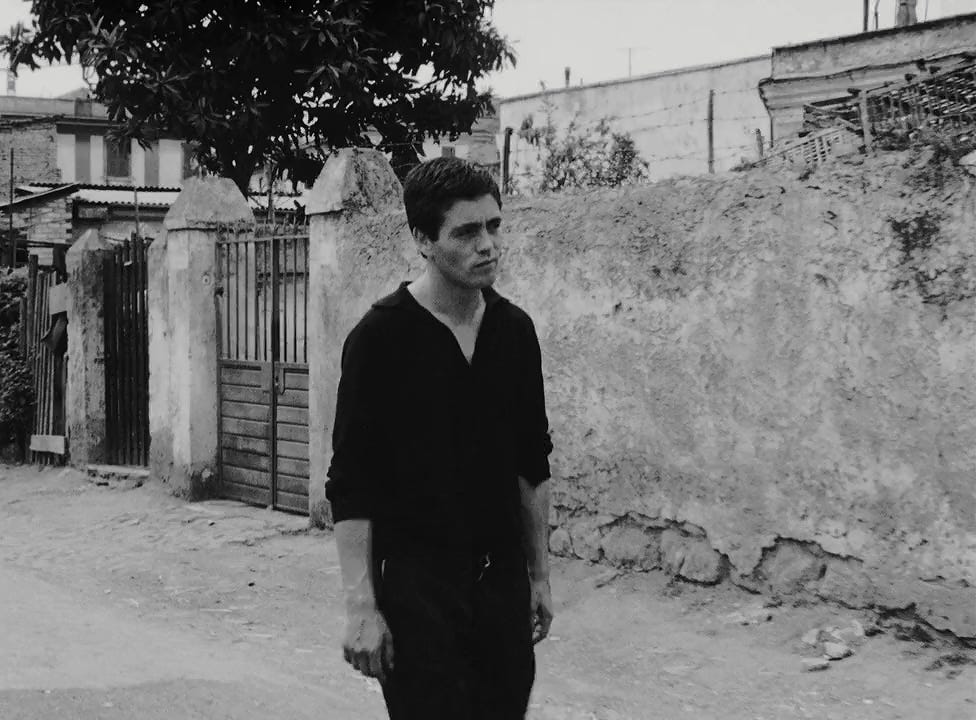One Last Red Envelope- Week 2
I made it through a good amount of titles last week, definitely better than my start thus far. I will warn you that these movies contain a multitude of elements that I’m sure will upset some, ranging from rape, incest, pedophilia, drug abuse and so on. I’ll try to not go into too much detail on each case, but a warning is still useful.
The Gore Gore Girls (1972)
I know that I appear to be a man of taste, one who appreciates art and culture. And that’s true, but sometimes I’m just as happy with some blood and TNA, which the works of Herschell Gordon Lewis offers in droves.
His movies aren’t very good, however, but that’s the game you play as a horror fan. You watch a lot of movies, many of which tend to be kind of crappy, in hopes of finding at least one or two good ones. I actually took off another title of his from my queue to save for something potentially more satisfying, while I kept this one… and eh. In this, a private investigator is hired to find out who murdered a stripper, but he gets more than he bargained for… I guess.
This movie has some crazy deaths, and certainly enough blood and boobs to appease young viewers as violence and sex were becoming more welcome in features. To my more modern sensibilities, though, I mostly appreciate how it ends by just… ending, complete with a cheeky sign letting us know that’s that. The honesty is appreciated, even if this is basically useless now when we can find all the bizarre fetish porn we want.
Murmur of the Heart (1971)
I said that I would watch more Malle after Vanya on 42nd Street, and by jove, I stayed true to my word.
Foreign films, the ones that make their way over here and receive critical acclaim have a tendency to be recognized as classy and more sophisticated than our Hollywood hogwash (funny as we’re one of the few countries that doesn’t dub over other country’s films, animation aside), but you probably wouldn’t think that if you saw this, which features a pair of brothers measuring themselves. Among, uh, other things/
Murmur of the Heart focused on 14-year-old Laurent, a boy who’s just as obsessed with jazz as he is with the concept of losing his virginity, a concept brought upon by his horndog older brothers. Laurent eventually gets his chance when his brothers hire a sex worker for him. This should be the highlight of his young life, but young Laurent soon has a heart murmur and can’t go to scouting camp. Instead, he and his mother Clara, who is in the process of divorce, check into a hotel, where he rushes after two girls his age, but has interest in someone a bit older.
This is definitely the kind of movie that will turn people off, and I can understand why. If even the slightest hint of incest disturbs you, do not look into this title. But if you’re up for a sweet if disturbing coming-of-age story, I think you’ll have fun.
Accattone (1961)
Switching over to Italian neorealism now, I was able to knock off a big title from my list, Pier Paolo Pasolini’s directorial debut.
Here, Accattone, a small-time pimp, loses his top sex worker when she’s arrested and he isn’t able to fend for himself without her. The film follows Accattone as he searches around this part of town looking for some kind of crumb to keep himself afloat. This is a poetic yet gritty, honest yet exciting work, one that I’m glad to finally get around to. It’s no Salo, though.
Reprise (2006)
Switching gears to something modern, I decided to familiarize myself a little with the works of Joachim Trier, who recently made a splash with The Worst Person in the World. That recent Oscar nominee was the third of his so-called Oslo trilogy, which takes place in the Norwegian capital.
And this is the first, in which Erik and Phillip, two aspiring novelists, send in their manuscripts hoping for some kind of success. Erik’s is rejected, but Phillip’s is accepted and he becomes a big name overnight. That doesn’t mean much to Phillip, though, as he’s treated for help after a suicide attempt following his split with girlfriend Kari. The film goes back between the two friends, as Phillip tries to replace his steps with his breakup while Erik tries again to become published and deals with his own tumultuous relationship.
Trier has an ear for character and an eye for blocking that I think makes his work stand out. Meanwhile, the passion focused on writing appeals to me and recalls my own relationship with some of my friends who aspire to do the same. This made me excited to check out more of his work, as we’ll get to in a moment.
Naked (1993)
Mike Leigh is another legend whose work I’ve been intending to delve deeper into. His 1993 feature Naked is among his most acclaimed work, so I decided to give it a shot.
Right away Leigh challenges the audience to stick around, when the protagonist, a loser named Johnny, is seen raping a woman behind an alley. There’s no hypotheticals, no speculation, it’s clear exactly what he’s doing. Before he can be arrested, he hijacks a car and drives off to London to stay in the flat of Louise, an old flame of his. Johnny hooks up with her roommate, Sophie, and spends his downtime digging through the streets as Johnny looks for some kind of meaning, some form of escape.
Clearly not an easy watch, Naked has a perverse sense of humor which I think benefits itself for an entertaining, if uncomfortable experience. The cast is quite good, with David Thewlis (who gave another incredible turn in Fargo’s third season) especially making Johnny feel as disgustingly charming as possible. He’s the kind of person who you want to hate, yet can’t help but welcome anyway.
The Spirit of the Beehive (1973)
I’m honestly surprised that it took me so long to get to this one, as it’s commonly on Turner Classic Movies and has subject matter that I’m interested in. Yet here I am.
In this film, which takes place during the end of the Spanish Civil War, a six-year-old girl named Ana is transfixed by a screening of Frankenstein, most notably the legendary sequence where the monster throws a young girl into the river. Ana is stuck on why he would kill a small girl like that, when her older sister Isabel says that this is just a film, but the monster’s spirit is real, and she can connect to him if she wishes. Ana believes this and keeps the concept of talking to Frankenstein’s monster in her pocket, later returning when she finds a wounded soldier in an abandoned house similar to the one the monster inhabited.
Despite my personal appreciation for poetic and symbolic filmmaking, I left Spirit of the Beehive slightly cold, finding it somewhat aloof and underwhelming. I’m glad that I got to see what is considered a classic of Spanish cinema, but it’s not one that I think will resonate with me. Yet. That’s the funny thing about movies, they stay the same while you don’t, and sometimes a film you’re left indifferent to can become a favorite over time.
Oslo, August 31st (2011)
More Trier, this time the second part of his Oslo Trilogy, but I’m sure you could tell it’s part of that with the title.
This focuses on Anders, a recovering drug addict who takes a 24 hour sabbatical from his rehab center to take a job interview, hoping to recover from his previous sabbatical, where he unsuccessfully tried to drown himself. It becomes an eventful day, where Anders catches up with old friends, but struggles to connect with his sister and ex-girlfriend, as he realizes that he can’t just go back home.
Oslo, August 31st isn’t a happy film and doesn’t offer a rewarding future for Anders, but not everyone gets a happy ending. Not everyone appreciates this level of honesty, so I can see this be a tough sit for some, but I’m glad that I got to it.
Night Moves (1975)
I love the New Hollywood period from the 70s, where fresh new talent were shaking up the system and releasing audacious, challenging movies on a seemingly weekly basis. Arthur Penn isn’t named with this movement as much, although he was an early voice, with films like Bonnie and Clyde expanding how violence could be portrayed on screen.
This neo noir project of Penn’s has been on my radar for a while, and I’m glad to get to it. Gene Hackman plays Harry Moseby, a private detective in Las Angeles who is growing weary of his work, yet receives a case too big to turn down- a retired actress wants her daughter, Delly, back so she can receive access to her trust fund. Harry travels to the Florida Keys to find Delly, who’s staying with her stepfather and his girlfriend, but she’s not interested in returning. And Harry soon finds out why when they return and learns there’s a reason that Delly was resistant to reunite with her “bitch mother”.
The film features a great performance from Hackman and a game turn from a sixteen-year-old Melanie Griffith, who does some things that I’m somewhat shocked by. Rather than focus on the negative or gross, luckily the story is engaging and Penn’s direction justifies his reputation. I really had fun with this one.










